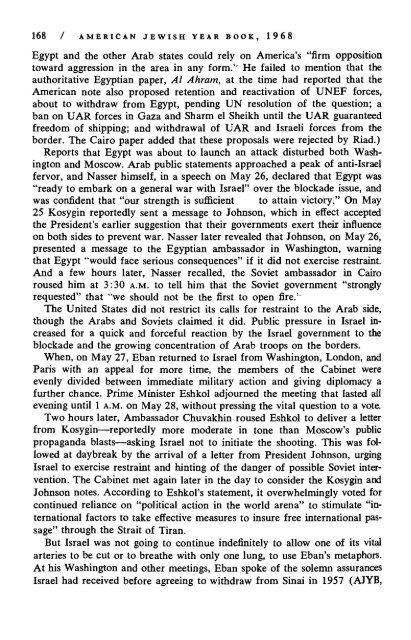1968_4_arabisraelwar
Create successful ePaper yourself
Turn your PDF publications into a flip-book with our unique Google optimized e-Paper software.
168 / AMERICAN JEWISH YEAR BOOK, <strong>1968</strong><br />
Egypt and the other Arab states could rely on America's "firm opposition<br />
toward aggression in the area in any form.' 7 He failed to mention that the<br />
authoritative Egyptian paper, Al Ahram, at the time had reported that the<br />
American note also proposed retention and reactivation of UNEF forces,<br />
about to withdraw from Egypt, pending UN resolution of the question; a<br />
ban on UAR forces in Gaza and Sharm el Sheikh until the UAR guaranteed<br />
freedom of shipping; and withdrawal of UAR and Israeli forces from the<br />
border. The Cairo paper added that these proposals were rejected by Riad.)<br />
Reports that Egypt was about to launch an attack disturbed both Washington<br />
and Moscow. Arab public statements approached a peak of anti-Israel<br />
fervor, and Nasser himself, in a speech on May 26, declared that Egypt was<br />
"ready to embark on a general war with Israel" over the blockade issue, and<br />
was confident that "our strength is sufficient to attain victory." On May<br />
25 Kosygin reportedly sent a message to Johnson, which in effect accepted<br />
the President's earlier suggestion that their governments exert their influence<br />
on both sides to prevent war. Nasser later revealed that Johnson, on May 26,<br />
presented a message to the Egyptian ambassador in Washington, warning<br />
that Egypt "would face serious consequences" if it did not exercise restraint.<br />
And a few hours later, Nasser recalled, the Soviet ambassador in Cairo<br />
roused him at 3:30 A.M. to tell him that the Soviet government "strongly<br />
requested" that "we should not be the first to open fire.'<br />
The United States did not restrict its calls for restraint to the Arab side,<br />
though the Arabs and Soviets claimed it did. Public pressure in Israel increased<br />
for a quick and forceful reaction by the Israel government to the<br />
blockade and the growing concentration of Arab troops on the borders.<br />
When, on May 27, Eban returned to Israel from Washington, London, and<br />
Paris with an appeal for more time, the members of the Cabinet were<br />
evenly divided between immediate military action and giving diplomacy a<br />
further chance. Prime Minister Eshkol adjourned the meeting that lasted all<br />
evening until 1 A.M. on May 28, without pressing the vital question to a vote.<br />
Two hours later, Ambassador Chuvakhin roused Eshkol to deliver a letter<br />
from Kosygin—reportedly more moderate in tone than Moscow's public<br />
propaganda blasts—asking Israel not to initiate the shooting. This was followed<br />
at daybreak by the arrival of a letter from President Johnson, urging<br />
Israel to exercise restraint and hinting of the danger of possible Soviet intervention.<br />
The Cabinet met again later in the day to consider the Kosygin and<br />
Johnson notes. According to Eshkol's statement, it overwhelmingly voted for<br />
continued reliance on "political action in the world arena" to stimulate "international<br />
factors to take effective measures to insure free international passage"<br />
through the Strait of Tiran.<br />
But Israel was not going to continue indefinitely to allow one of its vital<br />
arteries to be cut or to breathe with only one lung, to use Eban's metaphors.<br />
At his Washington and other meetings, Eban spoke of the solemn assurances<br />
Israel had received before agreeing to withdraw from Sinai in 1957 (AJYB,


